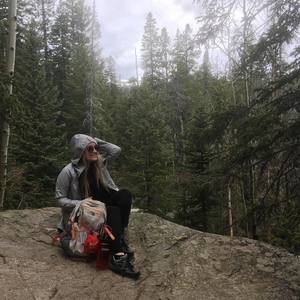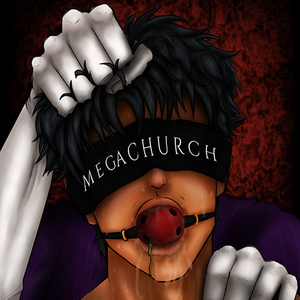The first time I saw their spectacle was many years later.
In the early days, my mother often hosted parties at night (at which my attendance was strictly mandatory), and more so, once Joy was born, the new baby was moved into my room because it was closer to the master. These things successfully distanced me from the window during sunset hours until the age of eleven.
The death of my little sister was the catalyst for many great decisions made by my mother regarding our family, of which the decision to move me back into the room by the master.
"I think it's best for all of us, James."
I didn't like when she called me James now. I wanted to be called Jaime, and only Jaime. It hurt that she wouldn't respect this sometimes. I told her this, but she didn't listen.
"Oh, come on. You know it doesn't even matter. James, Jaime, Juniper, I'll call you what I want!"
My mother was sprawled out on a gold and lavender day bed, right arm dangling off the side as if she was twirling it in some imaginary pond, hoping this would provoke some sort of genie to appear and grant her three wishes.
Her first wish she would use on Joy. This was wise. Had the genie been indebted to me, I too would have used this wish on Joy.
I am not too prideful to say that I loved my sister -- certainly more than myself, -- and it was never a secret that my parents, too, loved her more than me. When she was a newborn, she spent her days watching and observing, not crying and demanding like other babies I saw. Sometimes I would sit her up on the pile of soft toys I had in my bedroom and perform for her dance routines I had choreographed in my head. She watched with awe. When she was old enough, she would clap her hands and goo in appreciation, and when she was older still, I could teach her the dances so that she could join me. She was never on beat, and she hardly respected the moves; this ruined my rhythm and often made me forget my footwork. I forgave her anyways. She wasn't disciplined in the way that I was. She had a wild heart. She reminded me of the toddlers you see in the toilet paper commercials -- the ones who latch on to the first sheet and run around the house with it chasing the dog, unraveling the entirety of the roll as they went. The parents of the child, blurred and tucked away in the background but still able to be seen if you paid well enough attention, were horrified, visibly distressed by the scene, but the toddler, she was utterly joyful. And she shared that joy with every viewer watching the commercial at home -- her contagious laugh filling their speakers and echoing through their homes. Our Joy had that same laugh.
I remember once begging my parents for a dog, telling them it was to teach me loyalty and responsibility, but really, it was just to see this commercial -- this daydream -- turn itself into a reality.
The halls of our house had grown uncomfortably silent since Joy had passed. I could see the changes in my parents' faces -- my father's eyes always glassy and vacant, my mother's always half-closed. Without saying anything, I knew what my mother was thinking sprawled out on her daybed. She was wishing for Joy back.
But we still had two more wishes.
For the second one, I imagine my mother would try to make it honorable as well. The success of some children's charity, sponsored by the former J&J Realty -- now, Atwood Realty because the J's reminded her of Joy. I guess I can't be mad about this one, either. It's a decent act, a step towards the greater good, regardless of the intentions behind it.
But the third, this is where she would show her true colors.
She'd start by announcing some lie about how she has nothing else noble to wish for, having exhausted all her credible options on the first two wishes. "I really just cannot think of anything else." The struggling actress side of her peers out as she lingers too long and too obviously on the word "cannot," and then, before even a full moment's thought, she'll have discovered her wish, her next most coveted desire: money. "I wish to be rich." Simple, clear. "Richer than anyone else."
In the end, isn't that all she cares about anyway? How people see her? She wants not just to be envied, but to feel this envy people have for her as she walks by. Drink it, digest it, and piss it out at their feet. As everyone else goes on, struggling day to day through their sad little lives, June will be driving a Lamborghini, sipping on Dom Perignon in her Californian chateau, ordering caviar for breakfast and letting it go stale.
And so there my mother sat, stroking her imaginary pond and praying to her imaginary genie. My father stood over her, watching her, protecting her. "Do as she says, Jaime. She's grieving."
We were all grieving. Didn't they know that? And didn't they know that the room by the master, that was (still at that time) Joy's room. How could June and Jeff expect me to sleep there? To be constantly reminded of the soul that that space once belonged to? Whereas my mother was scheduling workers to paint over newly installed J&J Realty signs because she couldn't bring herself to look at the letter of her own first name seeing as it, too, was Joy's, I was being asked to take residence in the dwelling place of her daughter's ghost. Forever being haunted by the laugh which once reverberated from these walls, reminded of the daydreams that never would become reality.
Did she want me there for my own protection? She probably would say so. The mother June wanted to be depicted as would do anything for her children. She would keep them close and watch over them. She would never let something bad happen to them. She would be at their door when they cried, never more than a few seconds' walk away. She would peek into their rooms on her way to bed, ensuring that they are asleep and dreaming of soft, simple things. The perfect mother slept but a few feet away, separated from her children only by a thin wall, keeping them safe in her symbolic nursery until they themselves began to have children of their own.
It was a noble lie but a lie nonetheless. The truth, I think, was she hated to see what the room had become: a personless chamber adorned with all of Joy's toys, scattered on the floor and never to be played with again. A portal to a world riddled with memories of a babe whom she had failed to protect while she still could. She wanted me in this room so she could pretend that that is how it had always been. Joy was just as story people told, instead of proof of her shortcomings.
It was decided before it was discussed. Fleeing my grieving mother, I trudged to my room to discover it emptied. The startling vacancy invited a chill through my spine. One which traveled upwards, from the small of my back to the base of my neck until it dissipated across my scalp causing the hairs on my head to rise in a continuous wave as if ants were running across it.
My walls, once colorful with posters of movies I wanted to see and celebrities I wanted to look like, now returned to the musty yellow of the paint which resided underneath. My bed, the stack of books I kept next to it as a nightstand, the box of trinkets I kept underneath it. My dresser, the mirror that hung above it, the photos I had taped to the glass. All vanished, leaving only the dust that once lay upon them to settle on the floor.
My things, I found in her room. They had been moved in earlier that morning; Joy's things being removed to the garage or a storage unit or thrown out on the street somewhere.
Typical.
I remember the night that followed vividly. There was no need to cook that night. The refrigerator in our kitchen was filled with home-made casseroles and desserts, prepared by our neighbors and delivered to our door personally at the start of every morning, the tin or paper walls of their disposable containers always decorated with promises of thoughts and prayers. I wanted to eat alone. I made my own plate, portioning out a large square of lasagna and accompanying it with more chocolate pie than my parents would have allowed, and brought it upstairs to eat in my new room.
This room was smaller than the one I had when Joy was alive. Whereas the crib-turned-toddler-bed that once lived here fit fine, my full-sized mattress sat proudly in the center of the room, despite my father's efforts to push it tightly into the farthest corner. Its bedframe, thrown out with Joy's things, as it would have been too big for the space. My old room had a closet built in. Here, the rosewood-stained wardrobe that still stood against the wall by the door seemed to swallow half the living space. After this, whatever was left of the floor was mostly hidden by books and clothing thrown in haphazard piles, no attempts made to put them away.
The only thing I appreciated was the window. It was a luxury that in my other room I had gone without. I could look outside and see the mountains, the ocean, the sunset, and I could pretend that I was a part of the big world out there, not the small one in here. I opened it to let a slight breeze in before sitting down on my mattress to begin my dinner.
The new furniture couldn't trick you into thinking this was a new room. The left side of the doorframe still had markings that once tracked my growth from ages four to seven. The right side, its own markings, less faded, stopping at three years ten months. The hinges of the old wardrobe were coming loose; the doors didn't close well anymore. The part of the floor that could be seen was plagued with scratches on the wood, and the molding along the walls had grey stains from permanent marker designs that couldn't quite be washed away. Every bit of damage done left its mark -- evidence that this room had already been lived in.
Looking at the room was like reading a book. The story it recounted seemed meaningless: an infant drawing on the walls, the legs of a crib grazing the floorboards while being moved, an aging wardrobe. But the most important part of a story is not what is written, but what lives between the lines on its pages. The story here was one of love, of loss, of hope, and of devastation. I didn't want to read it, so I looked out the window instead.
The story outside the window was one of life, of beauty, of color. To the left, greens and browns: Douglas firs, hemlocks, red alders -- trees stacked in rows, dispersed at different elevations. The mountain they sat upon, a blanket covering the base of the sky. To the right, blues, whites, and yellows. The buildings of the town below were progressively turning down their lights, and just past their rooftops, the horizon was coated in a vast bed of Pacific waters. The sun in its descent began to dissolve itself into the ocean, its colors bleeding into the water and the clouds. It captured me in its trance, and I watched diligently as the blues and yellows of the Oregon sky turned to reds, pinks, and violets. The deeper the sun went, the more its colors stretched, farther and farther away from the ocean which sought to consume them, until they too found themselves overwhelmed by its power. Blue and yellow, turning to red and orange, themselves to pink, violet, then finally, all to black.
With the fall of night, everything was gone, erased. No more mountains or trees or oceans; no more scratches on the floor or marker stains. Nothing but a wave of darkness. Darkness which was only interrupted by two things: the stars in the sky and, below my current line of sight, at the house whose backyard lined ours, a porch light.
In its glow, there stood the Morstads. All of them, cuddled together under a thick checkered blanket -- not just Saxa and Emma, who I'd see often at school or playing on the street, but the father and mother and the newborn baby Kristoffer, too.
Had they been there the whole time? Under it all, taking it in as I had been? Had they seen me? Had they cared?
I lifted my arm to wave but became overwhelmed with fear. I hesitated, worried they might be -- what? Angry?
Before I could make my decision, they began to dissipate. Aksel was the first gone. The section of the blanket which once was wrapped around his shoulders, now being held in one arm by the mother, who held in her other arm the baby Kristoffer. Without any delay, she gently bundled it up and passed it to an eleven-year-old Saxa, who -- again without delay -- parroted this by bundling up and passing her section to Emma. By the time Saxa let go of the blanket, her mother was already disappeared inside the house.
Saxa, of course, in her turn parted, and in the yard there was left only Emma. She removed the heavy wool throw from her shoulders and cradled it in a ball which she hugged forcefully to her chest. Then, she stared to the sky one final time, as if she owed one last debt of appreciation to it. For a few moments, the stars stared back at her, shining and still just as she. Ultimately she, too, had to leave, and with a deep sigh, she bowed her head to the ground and followed the rest of her kin into the house.
Left alone, I closed the window and lay on my bed. Staring at the ceiling, I wondered what they must have been thinking, what they must have been feeling while out there. Oh, how it must feel to be a Morstad! To love and be loved like a Morstad!
These thoughts, they started so small, so innocent -- doesn't everything? My mistake was that I let them consume me, along with the emotions that came with them. The sadness and fear and angst of this day (and many days to come) replaced by a rush of hope so visceral that I felt its warmth spread through my skin. I gladly welcomed it. Please, come. Please, stay ... stay as long as you'd like.
I fell asleep that night to the lullaby this hope sung to me, my body fatigued by the way it danced through my veins. I dreamed of nothing, as nothingness was what I needed most. When I woke the next day, the window had been opened again, my barely eaten plate of chocolate and lasagna taken away.
I wondered if in truth, none of it had been real. And I might have believed so, too, had I not seen the Morstads outside, watching the sky go dark, every night since.












Comments (6)
See all